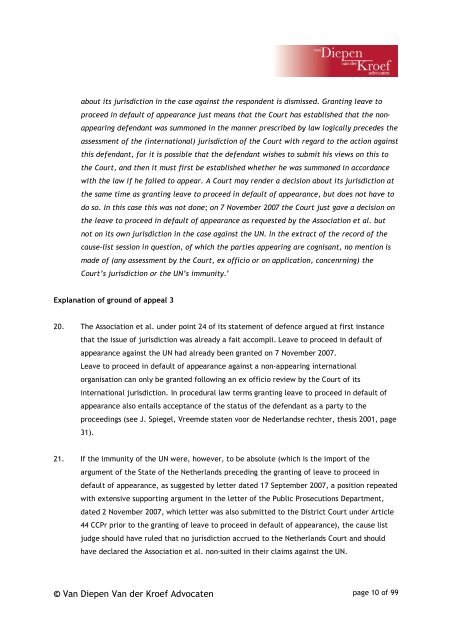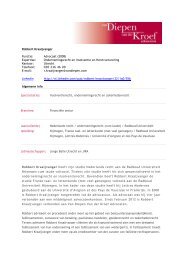© Van Diepen Van der Kroef Advocaten
© Van Diepen Van der Kroef Advocaten
© Van Diepen Van der Kroef Advocaten
- No tags were found...
You also want an ePaper? Increase the reach of your titles
YUMPU automatically turns print PDFs into web optimized ePapers that Google loves.
about its jurisdiction in the case against the respondent is dismissed. Granting leave toproceed in default of appearance just means that the Court has established that the nonappearingdefendant was summoned in the manner prescribed by law logically precedes theassessment of the (international) jurisdiction of the Court with regard to the action againstthis defendant, for it is possible that the defendant wishes to submit his views on this tothe Court, and then it must first be established whether he was summoned in accordancewith the law if he failed to appear. A Court may ren<strong>der</strong> a decision about its jurisdiction atthe same time as granting leave to proceed in default of appearance, but does not have todo so. In this case this was not done; on 7 November 2007 the Court just gave a decision onthe leave to proceed in default of appearance as requested by the Association et al. butnot on its own jurisdiction in the case against the UN. In the extract of the record of thecause-list session in question, of which the parties appearing are cognisant, no mention ismade of (any assessment by the Court, ex officio or on application, concenrning) theCourt’s jurisdiction or the UN’s immunity.’Explanation of ground of appeal 320. The Association et al. un<strong>der</strong> point 24 of its statement of defence argued at first instancethat the issue of jurisdiction was already a fait accompli. Leave to proceed in default ofappearance against the UN had already been granted on 7 November 2007.Leave to proceed in default of appearance against a non-appearing internationalorganisation can only be granted following an ex officio review by the Court of itsinternational jurisdiction. In procedural law terms granting leave to proceed in default ofappearance also entails acceptance of the status of the defendant as a party to theproceedings (see J. Spiegel, Vreemde staten voor de Ne<strong>der</strong>landse rechter, thesis 2001, page31).21. If the immunity of the UN were, however, to be absolute (which is the import of theargument of the State of the Netherlands preceding the granting of leave to proceed indefault of appearance, as suggested by letter dated 17 September 2007, a position repeatedwith extensive supporting argument in the letter of the Public Prosecutions Department,dated 2 November 2007, which letter was also submitted to the District Court un<strong>der</strong> Article44 CCPr prior to the granting of leave to proceed in default of appearance), the cause listjudge should have ruled that no jurisdiction accrued to the Netherlands Court and shouldhave declared the Association et al. non-suited in their claims against the UN.<strong>©</strong> <strong>Van</strong> <strong>Diepen</strong> <strong>Van</strong> <strong>der</strong> <strong>Kroef</strong> <strong>Advocaten</strong> page 10 of 99
















